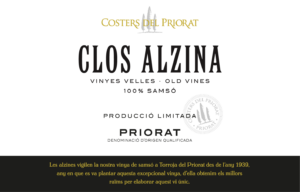Costers del Priorat Clos Alzina Priorat 2019
Costers del Priorat Clos Alzina Priorat 2019
Jose Mas Barberá and his Costers del Priorat is a leading voice in the evolution of the wines of Priorat, producing distinctive wines rooted in the terroir of the Catalan countryside. The wines of Costers del Priorat emphasize nuance and elegance over power, a philosophical departure from the strong, tannic wines that once defined the region.
Jose’s work in very privileged old vineyards in nine out of the twelve villages of Priorat allows him to focus on the different terroirs of Priorat, but with a unique twist. The majority of his plantings are carignan-based, and this includes his two most important sites, Mas Alsera and Sant Martí. All his limited production wines are classified as Vielles Vinyes (old vines), a designation that uses US WWII aerial maps to certify vineyards that are over 75 years old or planted before 1945.
Jose achieves this elegance by employing only organic farming methods, allowing the wines to guide their evolution without ever forcing their trajectory and utilizing a gentle élevage tailored to each vineyard.
Clos Alzina is a true grand cru parcel in the village of Torroja del Priorat. It is a high-elevation (600m), north-facing site planted in 1939 and is composed of steep, terraced vineyards surrounding the old Alsera masia (Catalan farmhouse) that dates from 1839. Clos Alzina comes from the very top portion of the Mas Alsera slope planted in decomposed yellow and red slate. The name Alzina is a reference to the acorn trees, many of which are planted around the vineyard to lure the local wild pigs into choosing the acorns while leaving the precious grapes in the vineyard. Although in the center of Priorat, wines from Torroja transmit a distinct feeling of freshness due to the cool air channeled into the village from the ocean by the surrounding mountains at night. Clos Alzina is a limited 100% samsó (carignan) Vi de Paratge bottling, built to improve with additional time in bottle. Wines are made with low intervention and minimal sulfur at bottling.
Vinification – After a manual harvest, fermentation occurs with indigenous yeasts in 500L French barrels, with subsequent 40-day maceration and spontaneous malolactic fermentation. The wine is then aged for 12 months in the same vessels.


